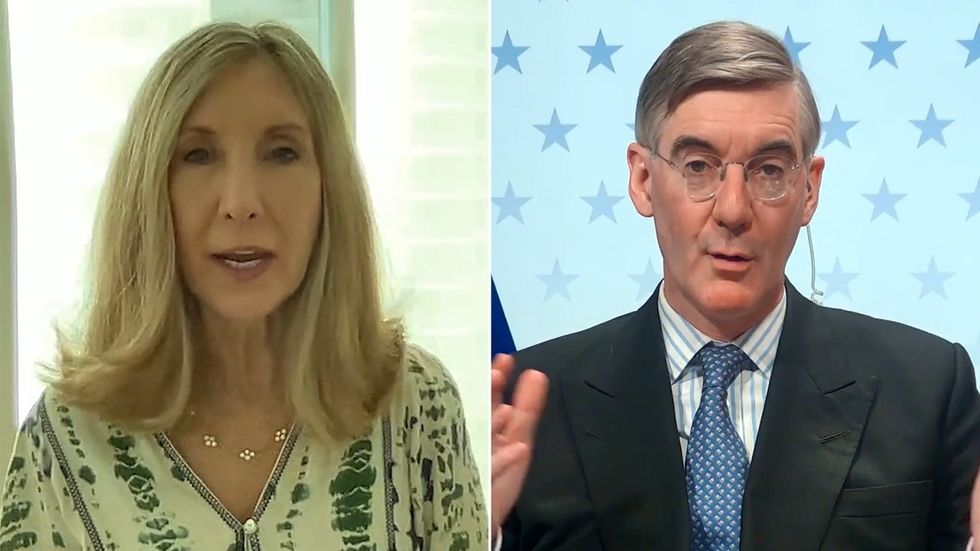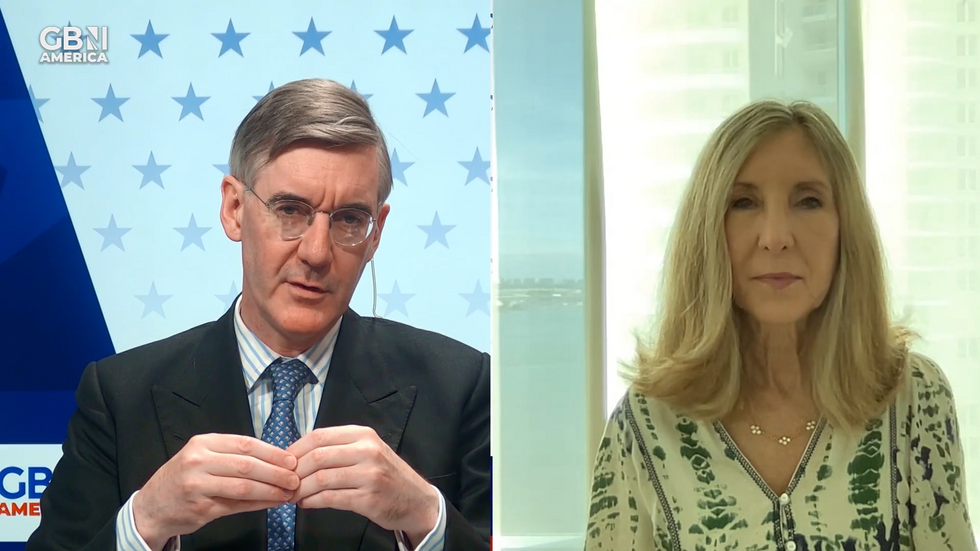Georgia Pearce
Guest Reporter
Psychiatrist Eva Ritvo has sparked a row with GB News presenter Jacob Rees-Mogg, as she claimed American families remain "divided" with "stirred up emotions" over Donald Trump's election win.
The emotional aftermath of Donald Trump's election victory continues to reverberate across American households.
The tensions show no signs of easing as President-elect Trump begins making key decisions about his incoming administration.
Speaking to GB News, psychiatrist Eva Ritvo explained: "This is a very unusual time in America, as you know, and we're just on the heels of a historic election."

And this was an election that stirred up a lot of emotions on both sides. And since the election, president elect Trump has been making a lot of decisions," she added.
"So people's emotions have not settled down, and people on both sides are either very excited or very anxious. And some of the issues are quite concerning to many people," Ritvo noted.
As Ritvo argued that Americans are "not in the space" to deal with political disagreements within families following the result, Rees-Mogg claimed that society has "become too wet" and "too emotional".
Rees-Mogg stated: "Society is just getting incorrigibly wet - if you went back to the 1950s, people just got on with things and we've got too touchy feely and emotional.

"Therefore people can't cope with disagreement and they frankly need to grow up."
LATEST DEVELOPMENTS:
Hitting back at Rees-Mogg, Ritvo argued that his point was an "oversimplification" as society is "exposed to an entire planet of people" compared to how news was consumed in the 1950s.
Ritvo said: "In the 1950s, we knew very little - we sort of knew what was going on with our neighbours, we had some sense of what was going on politically in the world. But we would catch it on the news possibly once or twice a day.
"What's happening now is that we are exposed to this entire planet of people, and we know there's concerning things going on all around the world."
Rees-Mogg then noted that there was a "much greater readership of newspapers" in the 1950s, and so people were "not so willing to emote in public" about what was happening in the world.

He argued further: "It just seems to me that people wearing their hearts on their sleeves weakens a nation. And the same is happening in the United Kingdom as well.
"People just need to get a grip and recognise that if somebody voted for Trump or for Biden, or even for one of the independents, that's not a matter over which friendships or families should break down, it's simply a difference of opinion."
Standing firm on her point, Ritvo hit back: "Again, I think that things are very different than they used to be and far more complicated, and people do know more than we used to know.
"We did know the headlines, but it's very different to read something than to visually see something and to viscerally experience what people are experiencing around the world.
"And so rather than saying we just have to toughen up, I think we have to figure out how we develop skills with this added information, and how can we cope best to help more people, to empower more people, and to not see other people as enemies."
Find Out More...
The emotional aftermath of Donald Trump's election victory continues to reverberate across American households.
The tensions show no signs of easing as President-elect Trump begins making key decisions about his incoming administration.
Speaking to GB News, psychiatrist Eva Ritvo explained: "This is a very unusual time in America, as you know, and we're just on the heels of a historic election."

And this was an election that stirred up a lot of emotions on both sides. And since the election, president elect Trump has been making a lot of decisions," she added.
"So people's emotions have not settled down, and people on both sides are either very excited or very anxious. And some of the issues are quite concerning to many people," Ritvo noted.
As Ritvo argued that Americans are "not in the space" to deal with political disagreements within families following the result, Rees-Mogg claimed that society has "become too wet" and "too emotional".
Rees-Mogg stated: "Society is just getting incorrigibly wet - if you went back to the 1950s, people just got on with things and we've got too touchy feely and emotional.

"Therefore people can't cope with disagreement and they frankly need to grow up."
LATEST DEVELOPMENTS:
- War on woke as Walmart stops selling chest binders and trans books in DEI crackdown
- Prosecutor files to dismiss presidential election interference charges against Donald Trump
- Trump will expel all FIFTEEN THOUSAND trans troops out of US military
Hitting back at Rees-Mogg, Ritvo argued that his point was an "oversimplification" as society is "exposed to an entire planet of people" compared to how news was consumed in the 1950s.
Ritvo said: "In the 1950s, we knew very little - we sort of knew what was going on with our neighbours, we had some sense of what was going on politically in the world. But we would catch it on the news possibly once or twice a day.
"What's happening now is that we are exposed to this entire planet of people, and we know there's concerning things going on all around the world."
Rees-Mogg then noted that there was a "much greater readership of newspapers" in the 1950s, and so people were "not so willing to emote in public" about what was happening in the world.

He argued further: "It just seems to me that people wearing their hearts on their sleeves weakens a nation. And the same is happening in the United Kingdom as well.
"People just need to get a grip and recognise that if somebody voted for Trump or for Biden, or even for one of the independents, that's not a matter over which friendships or families should break down, it's simply a difference of opinion."
Standing firm on her point, Ritvo hit back: "Again, I think that things are very different than they used to be and far more complicated, and people do know more than we used to know.
"We did know the headlines, but it's very different to read something than to visually see something and to viscerally experience what people are experiencing around the world.
"And so rather than saying we just have to toughen up, I think we have to figure out how we develop skills with this added information, and how can we cope best to help more people, to empower more people, and to not see other people as enemies."
Find Out More...